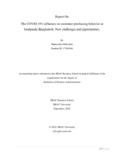The COVID-19's influence on customer purchasing behavior at foodpanda Bangladesh: New challenges and opportunities.

View/
Date
2022-09Publisher
Brac UniversityAuthor
Mehzabin, MubasshiraMetadata
Show full item recordAbstract
People can go on to an online food delivery platform to select a variety of eateries where they
can make their order and get their preferred meal delivered right to their door. This service only
recently began in Bangladesh, three years after it was introduced.
Everyone now lives in the digital world thanks to the internet, which has altered contemporary
society. Everything now looks incredibly futuristic thanks to technological advancement. A
recent survey revealed how how tech savvy and reliant on practical life people have become.
Digital technology has greatly accelerated and facilitated everyone's lives in the modern world,
when mobility and speed are the norm. Even eating, one of humankind's oldest rituals, has
changed as a result of the internet.
In December 2013, Bangladesh's Foodpanda Bangladesh Limited, a German business, was
founded. Rocket Internet, a renowned European internet corporation recognized for creating
startups and holding stakes in various models of the internet-based retail sector, was responsible
for its initial founding. The global brand Foodpanda, though, was sold to German rival Delivery
Hero on February 13th, 2017. After the purchase, Foodpanda underwent a significant rebranding
process and was merged with Foodora, another online firm that delivers meals.
Since their service has changed in many ways as a result of their rebranding, I tried to
concentrate in this report on the customer's perspective of Foodpanda Bangladesh Limited.
Rebranding is one of the various strategies used to present a company to clients in a distinctive
way. This report's goal is to defend Foodpanda Bangladesh Limited's current customer
satisfaction levels while evaluating changes in those levels over time by comparing the results to
historical data.
